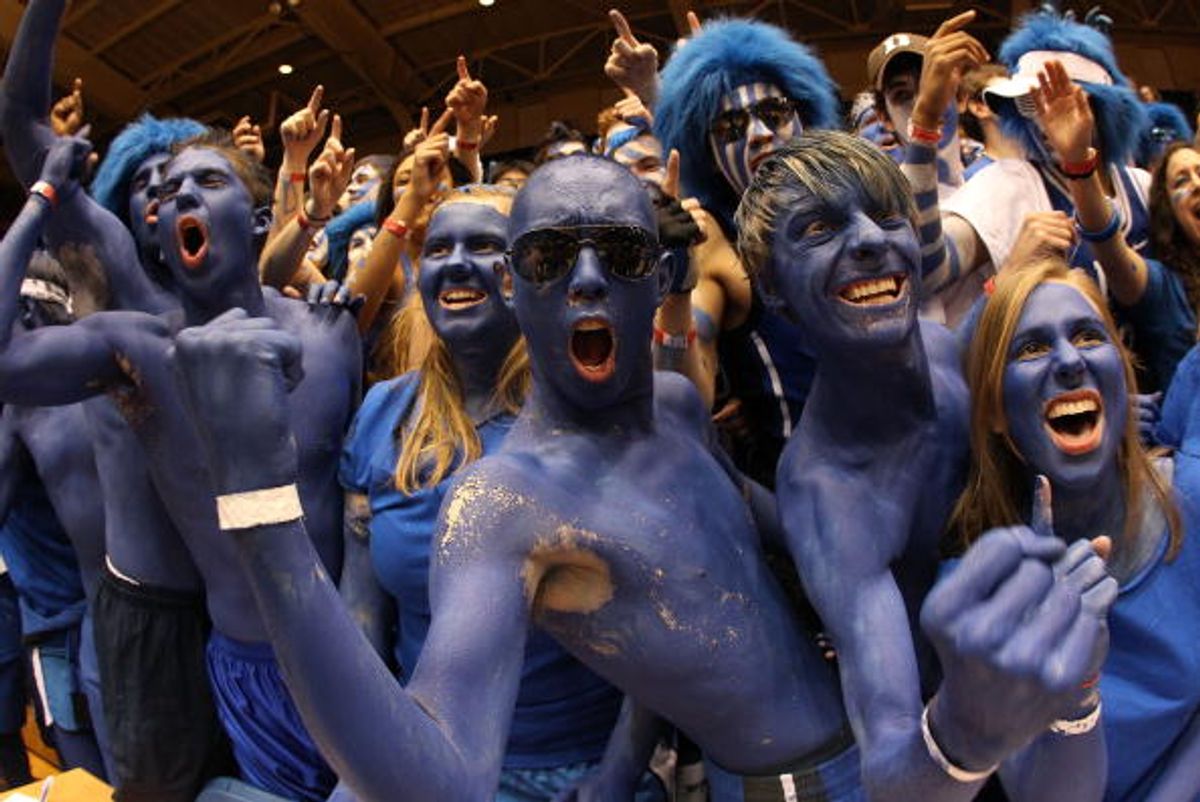With the beginning of the ever-optimistic spring season, the television is delivering yet another thrilling college hoops clinic, meaning it's time for us to gulp down our annual swig of Haterade — specifically, the blue-tinted kind. Once again, Duke basketball is upon us, and analyzing the root cause of widespread Blue Devils enmity has now become a Kremlinology-like sub-specialty among the sports cognoscenti.
Some, like ESPN's Bill Simmons, suggest that Duke is loathed because it supposedly gets preferential treatment — that is, better bracket placement — from NCAA officials. Columnist Paul Wachter goes further, asserting that Duke foes believe the team unduly "gets all the press and all the calls." Meanwhile, NBC's Mike Celizic proffers the mishmash hypothesis: "Haters think the Devils' fans are arrogant snots, that the coach is a pinch-faced biddy and that few of the players are NBA-bound."
Having grown up in Philadelphia during the city's championship-less dark ages, I've developed a particular expertise in (and appreciation for) such virulent sports resentment. And in the Great Duke Debate, I side with the Nation's Dave Zirin. Combining all the leading explanations, then adding Duke's status as an upper-crust, ultra-expensive private school, I subscribe to his theory that says our penchant for hating on the Blue Devils reflects America's larger, more complex relationship with privilege.
This makes sociopolitical sense. A country founded on anti-royalism and defined by anti-aristocrat political rhetoric will naturally profess disgust for, say, Ivy League presidential candidates and incumbent congressmen — just as it will loudly claim to despise Duke basketball (and Yankees baseball and Cowboys football and ... you get the point). In short, purporting to abhor inequality, advantage and dynasty has long been as red-bloodedly patriotic as loving mom, adoring apple pie and, yes, booing teams like the Blue Devils — teams that seem to wear their privilege on their jerseys.
And yet, evidence suggests our righteous inveighing against privilege is depressingly shallow — and possibly fraudulent. Note this recent New York Daily News report:
"When considering why Duke was conveniently placed on a fast track to (the Final Four by NCAA bracket makers), the power of the Blue Devils as a TV attraction must be factored into the equation," wrote the paper, adding that, simply put, "Duke has a history of juicing TV ratings."
This cannot be explained away as a mere product of Duke's alumni fan base or the watch-'em-because-we-hate-'em crowd. Those die-hard audiences, however passionate, are too small to account for such inflated national viewership figures.
We can hence conclude that a large segment of basketball fans who say they detest Duke — and who may consciously believe they detest Duke — actually secretly or subconsciously adore it and its privilege.
Which, again, makes sociopolitical sense. Populist as America's political pablum is, and much as our liberal and conservative protests perennially berate elites, we typically put one of those elites (Ivy League or otherwise) in the White House, almost always reelect our money-privileged incumbents, and even vote for those incumbents' progeny based exclusively on their dynastic surnames — just as we reward the Blue Devils (and Yankees and Cowboys) with higher TV ratings.
Of course, perhaps this moment will shift the paradigm — after all, sports, the economy and, well, everything else are so deeply and grotesquely stratified these days that maybe a backlash is in the offing.
Maybe audiences finally become more interested in the NCAA's up-from-the-bootstraps underdogs. Maybe voters in the next election throw all the bums out of office. Maybe — just maybe — we start reconciling our contradictory impulses about privilege.
Then again, maybe this is just my March madness still talking in April. But hey, it's springtime — anything's possible, right?



Shares